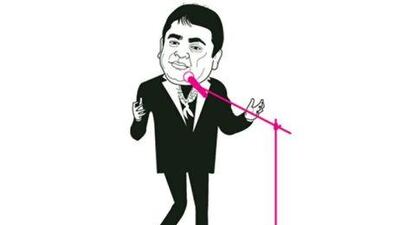The era of desi values and worldwide fame
This was the breakout decade. Bollywood actors would often say that they dreamt Oscar dreams, while the Indian government sent laughable movies off to the Academy for scrutiny. Only three films have ever been nominated: Mehboob Khan's Mother India (1957), Mira Nair's Salaam Bombay! (1988) and Ashutosh Gowarikar's Lagaan (2001). But generally speaking, Bollywood directors made films for the Indian masses – as they often claimed in interviews when asked about the lacunae in logic with the repetitive nature of the plots and complete disregard for "realism". But in the 1990s, the non-resident Indian began to come into her own. She was a graduate, she was hard-working, she was on her way up and, unlike her parents, she didn't have to "fit in". Space was being made for ethnicity; roots were being celebrated. And Bollywood was in.
Shah Rukh Khan
None of the great superstars have had any nepotistic support systems in the industry. Not Saigal, not Dilip Kumar, not Bachchan, not Shah Rukh Khan. His appeal is an odd, androgynous one. He is the only male actor to have appeared in a series of soap commercials otherwise designed for the female stars. He is also the first real crossover star, who has fan followings in unlikely places such as Germany and France; and in the “usual suspect” locations such as Lucknow and Leicester. He is witty, loquacious and a journalist’s delight. But what really matters is that he is box office gold – in India and abroad.
Karisma Kapoor
There was an unspoken rule in Bollywood: my son can become an actor, my daughter cannot, will not, over my dead body. It took Karisma Kapoor to defy her grandfather, the redoubtable Raj Kapoor, who had first publicly formulated this diktat. She became an actor and quite soon she was the toast of the great unwashed, starring in a series of questionable films with regressive themes, with Govinda, an actor who trumpeted his middle-class origins. Her sister Kareena Kapoor would soon follow.
Sooraj Barjatya
The Big Fat Indian Wedding? Sooraj Barjatya invented it in Hum Aapke Hain Koun…! and put "wedding planner" on the career list of the middle-class Indian. Barjatya came from a well-respected film family that had specialised in making small, clean films with unknown stars and great music: the Rajshris. They had all but been wiped out by Amitabh Bachchan's violent phase. Sooraj Barjatya brought them back with a bang in Maine Pyaar Kiya and the above-mentioned HAHK, both starring Salman Khan. He also reinvented the extra, choosing models in designer clothing over the old-fashioned kind, who often provided their own, somewhat shabby party clothes.
Aditya Chopra
Yash Chopra had two sons: Aditya and Uday. Uday has had a rather problematic career as an actor, but Aditya Chopra ensured his place in Bollywood’s cinematic history with his first directorial outing – Dilwaale Dulhaniya Le Jaayenge. This turned standard Bollywood practice on its head. In all films until then, the non-resident Indian (NRI) was a smoking-drinking-womanising ethical mess who could only be saved by a good dose of Indian values from the heartland. DDLJ was the first to suggest that NRIs could be good guys, too. And a new market was invented for Bollywood.
A?R Rahman
Allah Rakha Rahman is known to the international community as the guy who made the music for Danny Boyle’s Slumdog Millionaire. At home, he’s the go-to guy for the New Sound – the A?R Rahman sound, a bottom-feeder sound that reinvented Tamil cinema’s music and was soon to do the same in Bollywood. It was in 1992 that lorry drivers in Punjab started clicking their fingers to the music of Roja. With that film the pan-Indian phenomenon of A?R Rahman was inaugurated. Aided by the director Mani Ratnam’s new style of editing songs – which was, in turn, defined by the arrival of the MTV-style music video – soon Rahman was in Bollywood and directing music for the biggest banners in town.
Follow us
Follow us on Facebook for discussions, entertainment, reviews, wellness and news.

